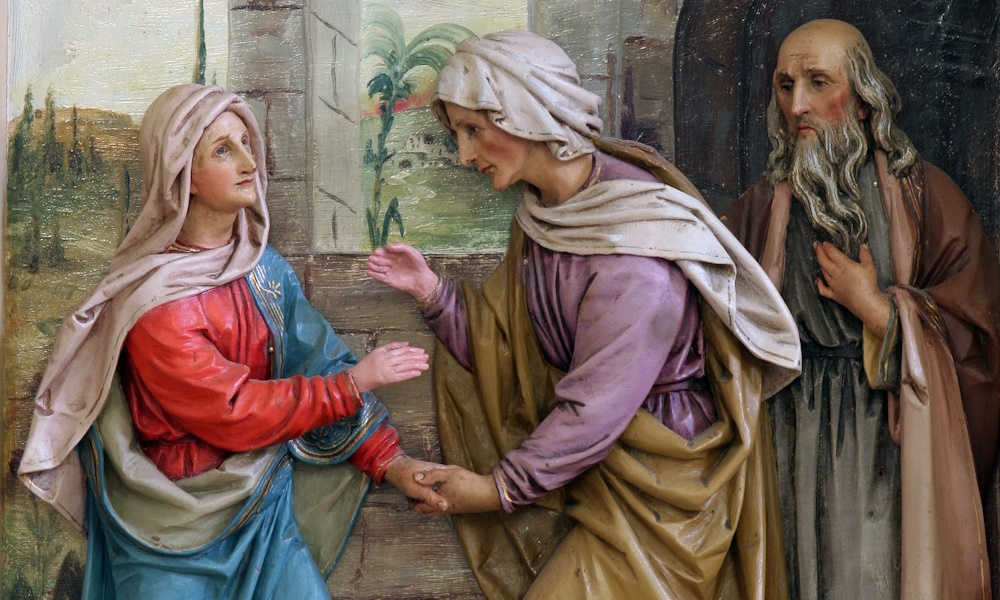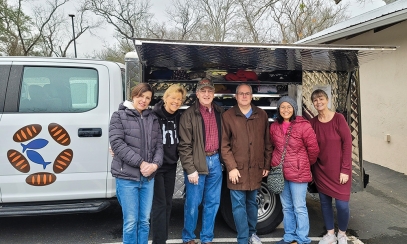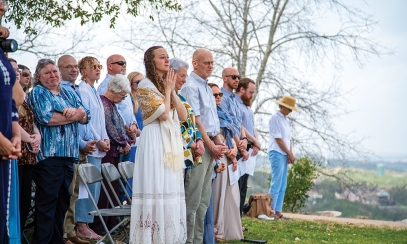
Striving to accompany, empower every pregnant woman
In a small, modest village, a 14-year-old woman discovers she is unexpectedly pregnant. She is betrothed but not yet married, living in a culture where extramarital pregnancy is not tolerated. This narrative applies to many women’s lives, but it is also the story of Our Blessed Mother. If we were in this situation, we would likely be tempted to make plans to take control of the situation and avoid social impact. However, Our Lady does not react in this way, rather, she chooses to have faith in what God has in store for her and decides to go and be with her cousin Elizabeth, who is also miraculously and unexpectedly pregnant. Elizabeth had been praying for a child and desperately wanted to be a mother. Even so, Mary understood in her own maternity and femininity the preciousness of motherhood and the necessity of unity in supporting one another in such a sacred time, even though Elizabeth was not necessarily in crisis.
In a small, modest village, a 14-year-old woman discovers she is unexpectedly pregnant. She is betrothed but not yet married, living in a culture where extramarital pregnancy is not tolerated. This narrative applies to many women’s lives, but it is also the story of Our Blessed Mother. If we were in this situation, we would likely be tempted to make plans to take control of the situation and avoid social impact. However, Our Lady does not react in this way, rather, she chooses to have faith in what God has in store for her and decides to go and be with her cousin Elizabeth, who is also miraculously and unexpectedly pregnant. Elizabeth had been praying for a child and desperately wanted to be a mother. Even so, Mary understood in her own maternity and femininity the preciousness of motherhood and the necessity of unity in supporting one another in such a sacred time, even though Elizabeth was not necessarily in crisis.
As Catholics, we are the Body of Christ, and “no part of the structure of a living body is merely passive but has a share in the functions as well as life of the body.” (Apostolicam Actuositatem, 2) Each individual has a responsibility to every other part of the body to participate in the life of the church. The health of the Body of Christ is impacted by the health of each individual member. Therefore, caring for and supporting one another is vital to the continued growth and health of our church.
The needs of our neighbors vary greatly, and each deserves particular attention, but there is a unique importance in supporting and accompanying families whether spiritually, materially or emotionally. Specifically, we must affirm the maternity and paternity of parents in all stages of life. As seen in Our Blessed Mother, when she said yes to the life of Jesus, she elevated maternity to something sacred. She recognized the enormity of her new role as mother and sought to accompany her cousin in accepting this role as well. Her understanding and acceptance of her identity as a daughter of God and her trust in Him allowed her to give of her love and time to support another in this sacred phase of life.
St. John Paul II said the family is the “first and vital cell of society,” and the role of mother and father is sacred and critical to proper development. Yet, in our society, parenthood is under attack, and the wounds that individuals hold often stem from the family. He notes that some consider motherhood as a limitation on the development of the female personality, a restriction on women's freedom and desire to have and carry out other activities. This pressure has compelled many women to renounce motherhood to dedicate themselves to professional work.
As the Body of Christ, we have a unique responsibility to affirm the dignity of parents in our community and re-establish the sacredness of parenthood, especially for families in need. In 2020, the U.S. Conference of Catholic Bishops began an initiative called Walking with Moms in Need, hoping to facilitate this support for families. This unique initiative seeks to mobilize parishes to become islands of mercy that act as the Body of Christ to each other. Due to the variation of needs throughout our communities, the way that a parish utilizes Walking with Moms in Need differs. Just like Elizabeth’s situation, not every pregnancy is a crisis pregnancy. However, the necessity of accompaniment and empowerment in this beautiful expression of vocation is critical.
Walking with Moms in Need offers a reality in which the culture of the parish can transform to have a comprehensive understanding of the resources that can support families in need, whether material, financial, medical, emotional, spiritual or relational. The beauty of Walking with Moms in Need is that it fosters an environment in which every family that is pregnant or parenting is seen, known and loved. Whether they are unexpectedly pregnant or have been trying to conceive for years, this initiative seeks to create a parish community in which parenthood is seen as a precious gift that is worthy of accompaniment and celebration.
For more information on Walking with Moms in Need, e-mail hannah-haddad@austindiocese.org.
Luisa de Poo serves as the director of Life, Charity and Justice for the Diocese of Austin. Hannah Haddad serves as the associate director of Life, Marriage and Family for the Diocese of Austin.




